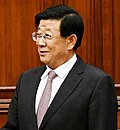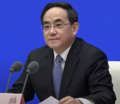List of provincial-level leaders
CCP Guizhou Committee Secretaries
| Image | Name (English) | Name (Chinese) | Term start | Term end | Ref. |
|---|---|---|---|---|---|
 | Su Zhenhua | 苏振华 | February 1949 | May 1954 | [1] |
| Zhou Lin | 周林 | December 1954 | October 1964 | [2] | |
| Li Dazhang | 李大章 | November 1964 | April 1965 | [3] | |
| Jia Qiyun | 贾启允 | May 1965 | January 1967 | [3] | |
| Li Zaihan | 李再含 | December 1967 | October 1969 | [3] | |
| Lan Yinong | 蓝亦农 | October 1969 | September 1973 | [3] | |
| Lu Ruilin | 鲁瑞林 | September 1973 | February 1977 | [3] | |
| Ma Li | 马力 | February 1977 | September 1979 | [3] | |
| Chi Biqing | 池必卿 | September 1979 | March 1985 | [3] | |
| Zhu Houze | 朱厚泽 | April 1985 | July 1985 | [4] | |
 | Hu Jintao | 胡锦涛 | July 1985 | December 1988 | [4] |
| Liu Zhengwei | 刘正威 | December 1988 | July 1993 | [4] [5] | |
| Liu Fangren | 刘方仁 | July 1993 | January 2001 | [4] [5] | |
| Qian Yunlu | 钱运录 | January 2001 | December 2005 | [4] [5] | |
| Shi Zongyuan | 石宗源 | December 2005 | August 2010 | [6] | |
 | Li Zhanshu | 栗战书 | 8 August 2010 | 18 July 2012 | [7] |
 | Zhao Kezhi | 赵克志 | 18 July 2012 | 31 July 2015 | [7] |
 | Chen Min'er | 陈敏尔 | 31 July 2015 | 15 July 2017 | [8] |
| Sun Zhigang | 孙志刚 | 15 July 2017 | 20 November 2020 | [9] | |
 | Shen Yiqin | 谌贻琴 | 20 November 2020 | 9 December 2022 | [10] |
 | Xu Lin | 徐麟 | 9 December 2022 | Incumbent | [11] |
Chairpersons of Guizhou People's Congress
- Xu Jiansheng (徐健生): 1980–1983
- Wu Shi (吴实): 1983–1985
- Zhang Yuhuan (张玉环): 1985–1993
- Liu Zhengwei (刘正威): January 1993–July 1993
- Liu Yulin (刘玉林): July 1993 – January 1994
- Wang Chaowen (王朝文): 1994–1998
- Liu Fangren (刘方仁): January 1998 – November 2002
- Qian Yunlu (钱运录): January 2003 – December 2005
- Shi Zongyuan (石宗源): January 2006 – 2010
- Li Zhanshu: 2010–2012
- Zhao Kezhi: 2012–2015
- Chen Min'er: 2015–2017
- Sun Zhigang: 2017–2021
- Shen Yiqin: 2021–2022
- Xu Lin: 2022–present
Governors
- Yang Yong (杨勇): 1949–1954
- Zhou Lin (周林): 1955–1965
- Li Li (李立): 1965–1967
- Li Zaihe (李再合): 1967–1971
- Lan Yinong (蓝亦农): 1971–1973
- Lu Ruilin (鲁瑞林): 1973–1977
- Ma Li (马力): 1977–1979
- Su Gang (苏钢): 1980–1983
- Wang Zhaowen (王朝文): 1983–1993
- Chen Shineng (陈士能): 1993–1996
- Wu Yixia (吴亦侠): 1996–1998
- Qian Yunlu (钱运录): 1998–2001
- Shi Xiushi (石秀诗): 2001–2006
- Lin Shusen (林树森): 2006–2010
- Zhao Kezhi: 2010–2012
- Chen Min'er: 2012–2015
- Sun Zhigang: 2015–2017
- Shen Yiqin: 2017–2020
- Li Bingjun: 2020–present
Chairpersons of CPPCC Guizhou Committee
- Shen Yunpu (申云浦): 1955–1956
- Xu Jiansheng (徐健生): 1956–1959
- Miao Chunting (苗春亭): 1959–1967
- Li Baohua (李葆华): 1977–1979
- Chi Biqing (池必卿): 1979–1980
- Miao Chunting (苗春亭): 1980–1993
- Long Zhiyi (龙志毅): 1993–1998
- Wang Siqi (王思齐): 1998–2006
- Sun Gan (孙淦): 2006–2007
- Huang Yao (黄瑶): 2007–2010
- Wang Zhengfu (王正福): 2010–2013
- Wang Fuyu (王富玉): 2013–2018
- Liu Xiaokai (刘晓凯): 2018–present